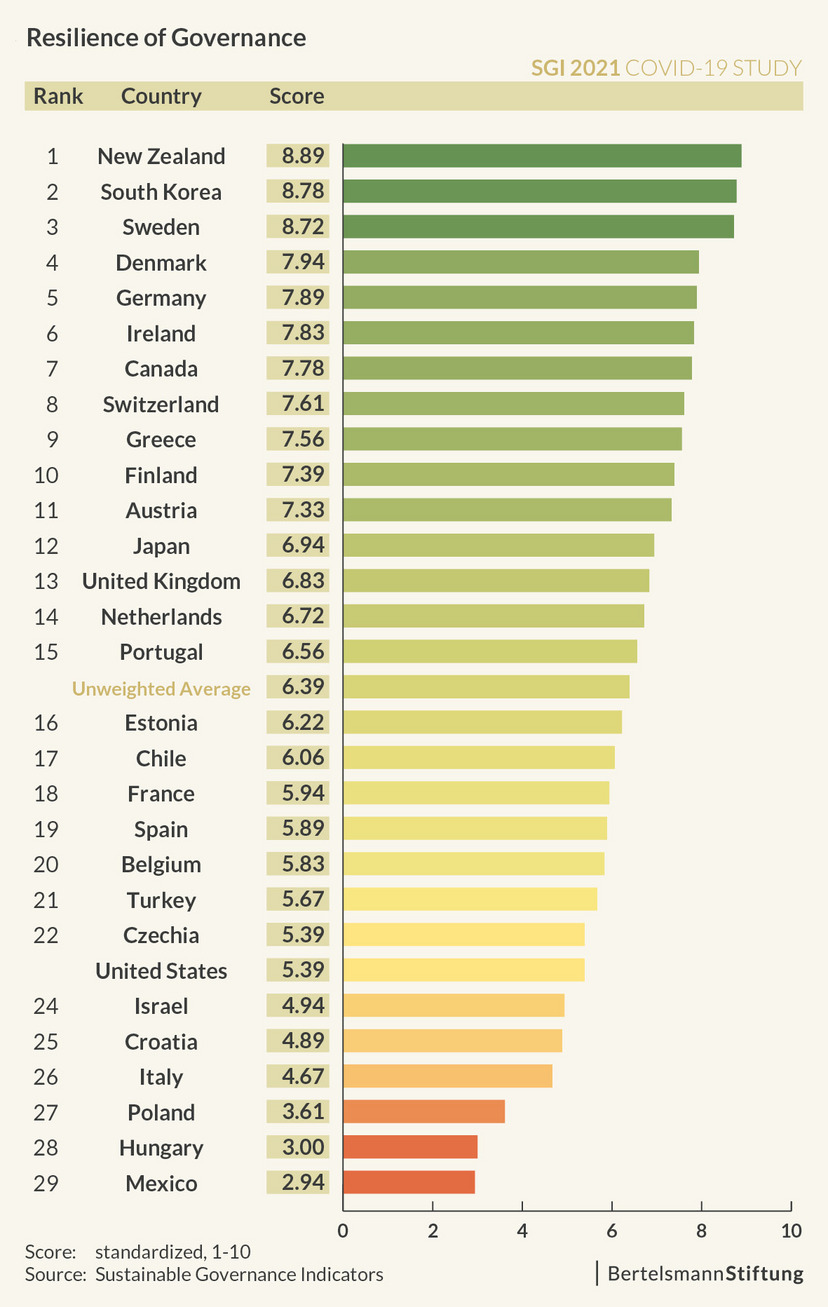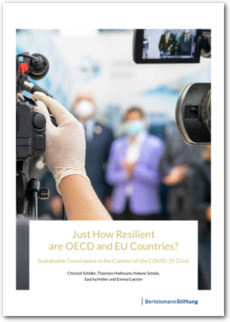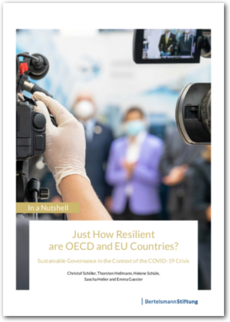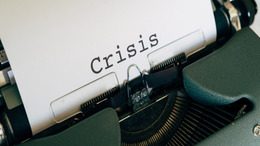Well-organized democracies have so far navigated their way through the coronavirus crisis better than those with deficits in this area. These democracies have benefited from their forward-looking and participation-oriented approach to governance. However, we see worrying developments continue in states where democratic values such as media freedom, civil liberties and the independence of the judiciary were already under threat before the crisis. These states also demonstrated the weakest performance in terms of their response to the crisis. These are the findings of a special survey conducted by our Sustainable Governance Indicators (SGI) project on resilience in the context of the coronavirus crisis. The survey examined the resilience of democracy, resilience of governance capacity, economic resilience and the resilience of the welfare state during the first year of the pandemic.
![[Translate to English:] Blick aus der Sicht der Kameras, die eine Pressekonferenz während der Corona-Pandemie halten.](/fileadmin/files/_processed_/e/3/csm_949840272AdobeStock_350682579_KONZERN_ST-NW_58cdb09f25.jpg)
© wellphoto - stock.adobe.com
Well-organized democracies better at navigating the pandemic
Is there a magic formula for getting through the pandemic with flying colors? What key factors help prevent eroding public trust in the state and democracy? An international study by us compared 29 OECD and EU countries to find out how well equipped they are to cope with the crisis. Sweden, New Zealand and Germany top the list; Greece also ranks high. Poland, Hungary and Mexico rank at the bottom.
Content
A robust democracy and a well-organized state are emerging as the critical success factors in coping with the coronavirus pandemic and its aftermath.
Christof Schiller, co-author of the study and governance expert at the Bertelsmann Stiftung
The pandemic as a litmus test for the state and democracy
New Zealand, Sweden and Switzerland top the ranking of resilient democracies, while Poland, Hungary and Turkey rank at the bottom. The governments of these latter countries exploited the pandemic to institute restrictions placed on civil rights. These rights have been temporarily curtailed in other countries as well, notes Schiller. "However, the issue then becomes the extent to which governments commit to restoring these rights as quickly as possible or to compensate as best they can for the loss incurred. In this regard, Ireland, New Zealand, Sweden, Switzerland, Estonia, Greece, Portugal and the United Kingdom were equipped with the most binding roadmaps."
The resilience of governance itself is also very important. South Korea was the only country surveyed to have featured a crisis management architecture that was prepared to handle a pandemic emergency. The country benefited from the experience it gained during the MERS pandemic. New Zealand caught up quickly, however, topping the rankings on the resilience of governance capacity as a result of its "go hard and go early" approach and its four-tiered COVID-19 alert system. Greece has also done quite well. The Netherlands, Portugal and France land in the midfield. The assignment of clear responsibilities and policy coordination posed problems for many states – not only the federally organized states such as Germany and Austria, both of which still ranked relatively well at 5th and 11th place, respectively. Crisis management arrangements in Mexico, Hungary and Poland received particularly low ratings, with Israel and the United States performing only marginally better. "Those states with the institutional capacity to prepare for a crisis and respond effectively to it while maintaining accountability will do better coming out of the pandemic. Being better prepared for future crises requires the regular adaptation of a state’s crisis management architecture," says Schiller.
In the vast majority of countries, legislatures were also poorly integrated into crisis management systems. However, this was mostly a factor of time constraints, as leaders often had to respond with rapid fire to the situation. In New Zealand and Denmark in particular, at least crisis communication proved effective, according to the experts. Hungary, the United States, Poland and Mexico received the worst scores in this regard during the crisis.
Well-organized democracies feature more robust economies and welfare states
In terms of the resilience of their economies as well as their welfare states, Sweden, Germany and Denmark were best prepared in the first year of the pandemic. Unsurprisingly, Germany tops the ranking of the most resilient economies, thanks to its comprehensive short-time work schemes and fiscal policy preparedness. Sweden and Switzerland also receive high marks in this area. Japan and France land in the midfield. The United States ranks among the bottom third. And once again, Mexico brings up the rear. All states have taken on massive debt during the crisis. "Credit-financed support has in some cases helped cushion the short-term economic and social impacts of the crisis. However, this support has yet to contribute significantly to long-term challenges such as the sustainable transformation of an economy," says Thorsten Hellmann, a co-author of the study and economic expert at our foundation.
Material
Additional information
Key questions guiding the SGI 2021 Special Survey “Sustainable Governance in the Context of the COVID-19 Crisis” are: How well do democratic oversight mechanisms work in a crisis? How well-organized is the political process of crisis management? How forward-looking and effective is policymaking in this regard? How vulnerable are the economic, health and social systems in OECD and EU countries, and how effective and sustainable are their responses to such crises? To answer these questions, 29 OECD and EU countries were assessed and compared on the basis of 94 indicators. More than 70 international experts from the academic community – who contribute to comprehensive reports for each country – are involved in the assessment process. A cross-national comparison of this nature makes it possible to identify examples of effective and sustainable coronavirus crisis management. The instrument is based on the following three pillars: the Resilience of Policies Index, which measures the vulnerability of economic and social policies to a crisis as well as economic and social policy responses to a crisis; the Resilience of Democracy Index, which measures the resilience of core democratic institutions; and the Resilience of Governance Index, which assesses how well prepared the executive branch is for a crisis, its response to the crisis and its accountability.










